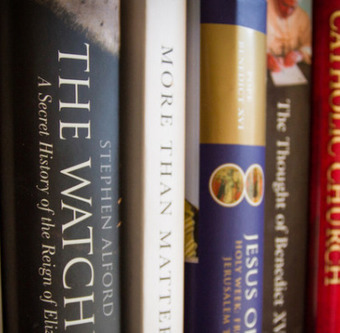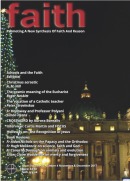
Book Reviews: How can Orthodoxy be reassured about the Pope?
The Papacy and the Orthodox. Sources and History of a Debate
by A.Edward Siecienski,
Oxford University Press, xiv + 510 pp, £47.99.
reviewed by Aidan Nichols
The book under review is an immensely learned and scrupulously fair account of an historic debate. The Latin tradition claimed with increasing emphasis, not to say stridency, that, presiding over the pastoral and prophetic ministry of the Church’s bishops, is an ‘office of Peter’ which is vested for all time in the bishops of Rome. The Greek tradition, or the Eastern tradition more widely, knew of a primacy of honour for the Roman pope, as the first among bishops, or, in later terminology, among patriarchs, but it refused to acknowledge in that figure anything remotely like the pretension to universal jurisdiction and infallibility in ex cathedra proclamation that were defined as de fide for Roman Catholics at the First Vatican Council (1869-1870). Professor Siecinski’s book starts out from the confession, first made by Pope Paul VI, that the papacy, which, on the Catholic understanding, is intended to unite the universal Church, is in fact the greatest obstacle to the overcoming of Christian divisions – especially with the Orthodox East.
Peter in Scripture and the Fathers
After an Introduction where this theme is salient, the book unfolds in nine chapters. The first two, which show great sophistication in handling modern exegetical tools, concern the New Testament portrait of Peter – both the basic facts (‘the Peter of history’) and the theological presentation of those facts by the inspired writers. The overall conclusion is that Peter enjoyed a priority within the apostolic group but not a power over its members. The next three chapters concern the Fathers of the Church: Peter as understood in patristic exegesis (here an amazing quantity of literature is surveyed from primary courses); the local church of Rome in the early patristic period, and how the papacy (the word had, however, not yet been invented) fared in the remaining centuries of the first millennium.
No consensus
The overall conclusion here is that there was no consensus in the first thousand years of Christian history as to the extent of the pope’s ministerial charge. Two chapters consider the papacy – through Greek eyes and its own - in the mediaeval and early Renaissance period when the Great Schism was confected (above all by the body-blow dealt to what remained of East-West harmony in the Crusades). A penultimate chapter takes the story up to Vatican One, and a final chapter to Vatican Two and the post-conciliar ecumenical dialogue between Catholics and Orthodox which continues, albeit with some dragging of feet from the Orthodox side, until the present day. The overall conclusion here is that, despite efforts at eirenicism (notably at the Council of Florence, 1438-1439) the increasing clarity with which the West affirmed the monarchical nature of Church authority and the East its synodical character created an impasse from which (attempts in modern ecclesiology to synthesise the two concepts notwithstanding) there is no obvious means of exit.
A remote prospect
It is a tribute to the fastidiousness of Siecinski’s scholarship and the integrity of his mind that no one without inside knowledge of the man would be able to determine from this text whether he is himself a Catholic (as his Polish name might suggest) or an Orthodox. I understand that he is fact a convert from Catholicism to Orthodoxy. But there is none of the proverbial zeal of the convert displayed here, only a sadness that, in the light of the massive divergence the sources indicate, recovery of unity between Catholics and Orthodox is a remote prospect indeed.
As a history of its subject this book is likely to be the principal reference-point for students for a very long time. What it does not attempt, however, is a theological resolution of the issues which have bedeviled Orthodox attitudes to the pope. How if at all could the primacy of jurisdiction and ex cathedra infallibility in teaching affirmed at Vatican One be rendered acceptable to the Orthodox Church?
Alarming epithets
I take the issue of jurisdiction first. The at first sight alarming series of epithets which characterize papal jurisdiction in Pastor aeternus (where a jurisdiction ‘supreme’, ‘full’ and ‘universal’ is further described as ‘immediate’, ‘ordinary’, and ‘truly episcopal’) has been misunderstood by theologians and canonists insufficiently aware of the background of the language used. ‘Immediate’, ‘ordinary’ and ‘truly episcopal’ do not licence papal interventions here, there and everywhere. They simply affirm that the universal jurisdiction in question belongs inherently to the office of the bishop who carries the primatial charge. Just how that charge is to be exercised is nowhere indicated in the text, and the possibility remains, therefore, that outside the Latin church the jurisdiction will be exercised via the patriarchs and ruling synods of the Oriental churches – normally, by way of reaction, namely, in the event of patriarchs or ruling synods calling on the pope for mediation in some dispute (‘appellate’ jurisdiction), and abnormally, in the pope taking some initiative to bring a matter to the attention of such patriarchs and synods. The key concept here is that the bishop of Rome, as the first in the ecclesiastical ‘taxis’, the order of the local churches and their pastors, has a responsibility for ensuring the harmonious functioning of that taxis as a whole.
Ex cathedra
What of the infallibility in teaching? What has been called the ‘small print’ of Pastor aeternus (the preamble to the definitions) makes it plain that ex cathedra definitions of doctrine by the pope are intended for situations where the college of bishops is divided – where it finds itself in a condition of irresoluble internal doctrinal conflict. An episcopate too divided to pronounce on a disputed question in doctrine will have in the person of the pope a teacher who, by his own exercise of the infallibility with which the whole Church is endowed, can enable the teachers (the bishops, witnessing to the faith of their churches) once again to teach with a single voice. If this is so, it is doubtful whether the ex cathedra function of the pope has ever yet been set to work. At any rate, the two Marian dogmas, of 1854 and 1950 were certainly not promulgated in this sort of crisis-situation.
Moreover, it was specifically affirmed on behalf of the drafters of Pastor aeternus that the phrases ex cathedra does not extend to any and every example of public teaching by the pope (this was to exclude St Robert Bellarmine’s exaggerated notion that the pope is always infallible except when speaking as a private doctor). What is needed, however, so as to reassure the Eastern Orthodox is some mechanism whereby a pope who departs from Tradition by teaching error, or what may be construed as error, can be inhibited by a form of ecclesiastical enquiry or trial – as is the case with any other bishop in the Church. The axiom ‘The first see can be judged by no one’ must not be abused to let a pope who is careless of doctrine get away with spiritual murder.
Notes:
Aidan Nichols, O. P., is a writer and researcher at Blackfriars, Cambridge.

